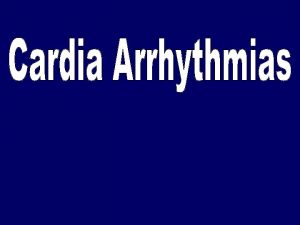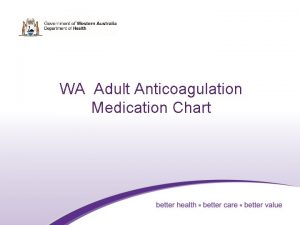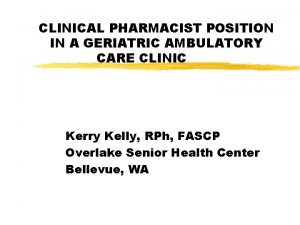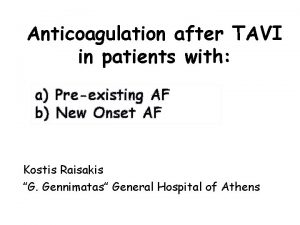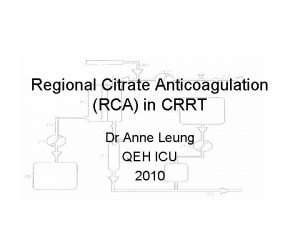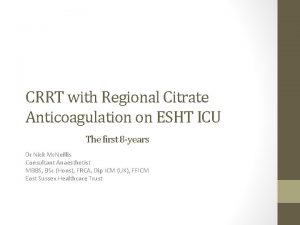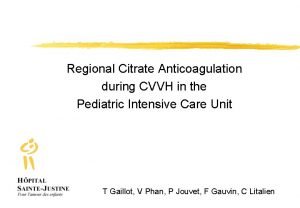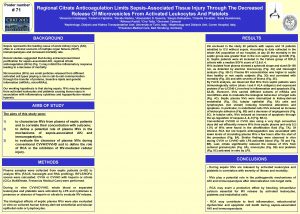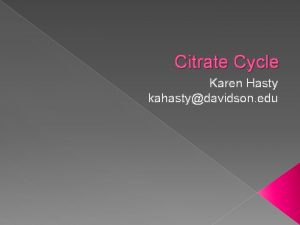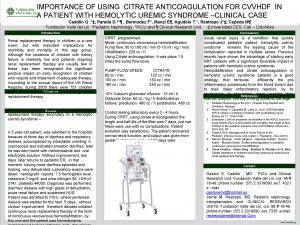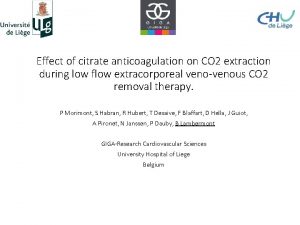OUTCOMES OF REGIONAL CITRATE ANTICOAGULATION RCA IN PEDIARTIC








- Slides: 8

OUTCOMES OF REGIONAL CITRATE ANTICOAGULATION (RCA) IN PEDIARTIC CONTINUOUS RENAL REPLACEMENT THERAPY (p. CRRT) IN A SINGLE CENTER Issa Alhamoud, Diane Gollhofer, Raymond Quigley. Division of Pediatric Nephrology University of Texas Southwestern Medical Center, Children’s Medical Center, Dallas, Texas, United States I have no conflict of interests to resolve or disclose

q Introduction: § The efficacy of Continuous Renal Replacement Therapy (CRRT) in critically sick children is dependent largely on the anticoagulation of circuit. § Systemic heparin. § Regional citrate anticoagulation (RCA). q Objective: § Circuit lifetime with regional citrate anticoagulation versus systemic heparin. § Circuit lifetime with RCA X 1 (ml/hr) of blood flow rate (BFR) (ml/min) versus RCA X 1. 5 (ml/hr) of BFR (ml/min). § Correlation between circuit ionized calcium and circuit lifetime.

Methods § Retrospective study: § Inclusion Criteria: All patients (1 day-21 years) who required CRRT>48 hours using either CVVH or CVVHDF including ECMO patients between Jan 2013 -Dec 2016. § Exclusion criteria: CRRT<48 hrs or CRRT without anticoagulation. § Parameters: Ø Circuit lifetime (hrs): RCA vs Heparin and RCA X 1 of BFR vs RCA X 1. 5 of BFR. Ø Mean circuit i. Ca for each circuit in citrate group. § CRRT Protocol: BFR ACD-A Ca. Cl 0. 8% Heparin Dialysate Filter 2 -12 ml/kg/min, rarely >150 ml/min 1. 5 X BFR (ml/hr) 0. 4 X BFR (ml/hr) 0. 3 X BFR(ml/hr) 2000 ml/1. 73 m²/hr. RCA: Ca-free HF 1000 (1. 1 m²) 1 X BFR (ml/hr) Bolus: 10 units/kg Maintenance: 10 -20 u/kg/hr Circuit i. Ca (0. 30. 6 mmol/l) Pt i. Ca(1. 1 -1. 3 mmol/l ACTs(160 -195)

Results Citrate Heparin Patients number N=60 N=67 Age (Mon)(IQR) 126 (36 -180) 60 (12 -132) 0. 004 Weight (kg)(IQR) 28 (17 -57) 19(9. 4 -52) 0. 011 Diagnosis Sepsis Malignancy/Sepsis BMT/Sepsis CHD Liver disease AKI/ESRD Drug ingestion Trauma 11 13 13 5 7 6 1 4 14 5 4 24 9 6 1 4 Mortality 23(38%) 28(41%) CRRT duration (hrs) 18670 12501 Filters number 258 337 P NS


Pt #: 26 Pt #: 34 Circuits #: 149 Circuits #: 188 T. duration: 8634 hrs T. duration: 10036 hrs


Conclusions • Circuit lifetimes were longer in citrate-based anticoagulation as compared to systemic heparin. • RCA that started at infusion rate (ml/hr) equal to BFR (Qb) (ml/min) had similar hemofitler lifespan to RCA that started at infusion rate 1. 5 times of BFR. This could decrease the cost of CRRT and potentially reduce the risk of citrate toxicity. • Circuit lifetime was negatively correlated with circuit ionized Calcium level
